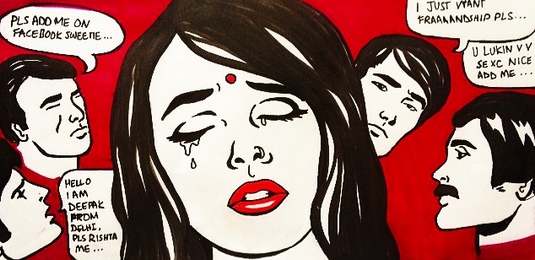by Amina H. – Follow @browngirlmag
Imagine going through life feeling like a foreigner among your own people. Imagine being called, “weird, abnormal, strange.” Imagine locking yourself in your room crying because you feel like nobody understands you. Imagine hating yourself because desperately want to change and conform, yet you just can’t….
A lot of people identify that as how it feels like to be a teenager.
They understand the period will pass and things would be fine.
Unless you grow up in a society where conforming is the rule of the game, and you live your life in line with what people expect of you. So when you grow up different, you hear so many words, a lot of them hurtful…
A friend of a friend is single at 30 in a South Asian community, and she’s really fed up with people pressuring her to settle down and get married.
Another one refused a proposal?—?or rishta?—?and had her aunties call so much she broke down.
Another one gets compared with a cousin her own age who has three kids. It doesn’t matter that she has three degrees.
[Read More: Help! The Pressure to Marry and Have Kids is Destroying Us]
Every time I hear such a story, I wish I can ask those aunties,
Why are you saying this? What’s the purpose? You want the girl to be happy? Then she is happy without your comments…Like, seriously…why? Do you feed off other’s misery? Are you dementors?
But they say those things out of habit, because it was what society told them before, and so they got pressured into settling. Half the time, their own lives are actually miserable, and I feel that alone needs to discredit the next marriage advice that comes out of their mouth.
Yet there are many 30 and 40-year-old females who are made inadequate today just because they’re nobody’s wives and nobody’s mothers. They’re not just in South Asia, but the Middle East and Africa and China. And today I would like to take a minute to say this,
Be proud of who you are and what you’ve achieved. You’re worthy as you are, and don’t need society to love you to love yourself. You’re wonder woman.
It’s really hard to build the fortitude to overcome these comments. Especially in our societies. They just keep on coming and coming and coming. No matter how many times you hit them, they keep on coming, like tennis balls out of a machine. At some point, you just want to throw your racket away and run.
I personally try to remind myself.
The world is a place.
The world is a place.
I first saw the comment in Obama’s book, Dreams From My Father. The context in which the phrase appears is not important, because it’s such a simple statement and yet can be powerful and profound if you interpret it that way. Whenever someone says something hurtful and judgmental to me, I just remind myself that the world is a place. It’s a huge place that houses seven billion human beings other than the one who was hurting me at the moment. The world is a place; an expansive and abundant place, and this person is making judgments based on their very limited view of it.
Because the world is a beautiful place and instead of engaging with all its beautiful glory, this person chooses to waste time picking on people, bullying them, judging them and hurting them. So, yeah, instead of getting angry or hurt, all I do is end up pitying them.
Because the world is a place, and they’re missing out on it.
[Read More: Unlucky in Love?: Here’s How One Brown Girl Learned to Open Her Heart]
 Amina H. is an engineering student who blogs at ahscribbles.com.
Amina H. is an engineering student who blogs at ahscribbles.com.





